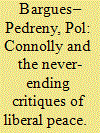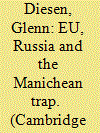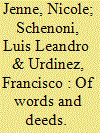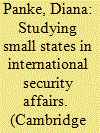|
|
|
Sort Order |
|
|
|
Items / Page
|
|
|
|
|
|
|
| Srl | Item |
| 1 |
ID:
157532


|
|
|
|
|
| Summary/Abstract |
Over the last decade, a dominant critique of international interventions underlines the problem that interventionary strategies have denied the political, societal and cultural heterogeneity of conflict-affected societies, excluding the interests of the majority of their population. A deeper engagement with the everyday life of these societies is understood to expose the errors of international missions and animate an alternative way of thinking about peace: ‘hybrid peace’, which is formed contextually and from below. Engaging with William Connolly’s work on pluralism, this article clarifies the nature of this critique, which rests securely on the assumption that local alterity cannot be fully understood, respected or treated sensitively by international governance approaches. However, as much as this assumption enables the thinking of an emancipatory hybrid peace, it is in turn the source of its critique, as hybrid peace is also seen as reproducing binary schemas and thus considered incapable of caring for the societies intervened in. At the conclusion, the metaphor of vorarephilia—paraphilia where sexual arousal occurs in the idea of being eaten or eating another person—will be used to warn against the tragic direction that critiques seem to be travelling to: critical scholars would be increasingly tempted to welcome the inevitable failures of international interventions.
|
|
|
|
|
|
|
|
|
|
|
|
|
|
|
|
| 2 |
ID:
157528


|
|
|
|
|
| Summary/Abstract |
Contrary to what the EU’s image as a civilian power suggests, the EU member states have had 50,000–100,000 troops deployed outside their home countries for most of the post-Cold-War period. Although the vast majority of these troops were active in operations with a strong European presence, the member states’ patterns of military engagement differ significantly. This study provides a systematic analysis of the member states’ contributions to military operations. More specifically, it examines which (combinations of) conditions consistently led to participation in EUFOR Congo, UNIFIL II, EUFOR Chad, the 2011 military intervention in Libya and the air strikes against the Islamic State. Methodologically, it builds on most different similar outcome/most similar different outcome and qualitative comparative analysis. The results of the analysis show that four conditions account for the bulk of the member states’ patterns of military engagements: military resources, competing deployments, UN peacekeeping tradition and regional trade.
|
|
|
|
|
|
|
|
|
|
|
|
|
|
|
|
| 3 |
ID:
157530


|
|
|
|
|
| Summary/Abstract |
Conceptualizing the EU as a postmodern cooperative power that “transcends realism” provides ideological scaffolding for an exclusive conception of “Europe” and veils a zero-sum geopolitical project as “European integration”. Neoclassical realism considers assigning morally opposite political identities to the EU and Russia to be “rational” to the extent it strengthens internal cohesion and mobilizes resources to enhance security in accordance with the balance of power logic. Yet, the artificial binary construction can also produce a Manichean Trap when compromises required to enhance security are depicted as a betrayal of indispensable virtues and “Europe”. The ability to harmonize competing security interests diminishes as the conceptual space for comparing the EU and Russia is de-constructed. Competition is framed in uncompromising terms as “European integration” versus Russian “spheres of influence” and democracy versus authoritarianism.
|
|
|
|
|
|
|
|
|
|
|
|
|
|
|
|
| 4 |
ID:
157529


|
|
|
|
|
| Summary/Abstract |
France is one of the most prominent European military powers and a strong proponent of an independent European military capability. Yet, France’s actions since 2009 suggest that it may be prioritizing the transatlantic relationship over the development of the European Union’s Common Security and Defence Policy. Does this signal a fundamental Atlanticist shift in the way that France envisions its future defence and security, or does it simply signal a temporary re-evaluation of French Europeanist security ambitions? Our analysis attempts to answer whether there is presently an Atlanticist shift evident in French foreign policy, and whether any such shift is rooted in a desire to preserve French influence through international institutions such as the North Atlantic Treaty Organization. This paper combines elite interviews with content analysis of French media comparing the current time with the mid-1990s to determine whether there is a shift in how defence and security issues are discussed and, if so, whether that signals a fundamental change. We find that, while there is a shift, it does not necessarily indicate a more Atlanticist posture, but suggests rather a pragmatic move to further French security goals through the most effective institutional mechanisms available.
|
|
|
|
|
|
|
|
|
|
|
|
|
|
|
|
| 5 |
ID:
157531


|
|
|
|
|
| Summary/Abstract |
The idea of an integrated Latin American region goes back to the early post-independence period, and yet, in substance, Latin American regionalism has remained far behind its stated aims. The perceived implementation gap has raised the question why policymakers continued to talk about something they appeared to avoid in practice. This article contributes to the debate on Latin America’s integration gap by exploring the phenomenon of declaratory regionalism - the practice of referring to the region and its institutions in political speeches. Based on quantitative text analysis of the speeches presidents delivered annually at the UN’s General Assembly between 1994 and 2014, we show that this practice has not been uniform. Presidents distinguish between different forms of regionalism, integration and cooperation, and frame the geographical region they refer to accordingly. In motivating presidents to speak about integration as opposed to cooperation, ideology and democratic performance stand out as crucial factors.
|
|
|
|
|
|
|
|
|
|
|
|
|
|
|
|
| 6 |
ID:
157534


|
|
|
|
|
| Summary/Abstract |
Global publics and local actors are increasingly saturated with variegated still and moving images. The important role played by images in world politics, however, remains understudied in the International Relations (IR) discipline. This article argues that the Kurdish geopolitical space is increasingly tied to a new regional and global imagination, which emanates from verbal–visual meaning-making strategies such as narrative reconstructions and pictorial representations (for example illustrations, pictograms, or photographs). The article’s investigation illustrates how the construction of new Kurdish geopolitical imagination became increasingly regionalized and internationalized during the war against the so-called Islamic State (IS), particularly after the Kobane siege in Syria in late 2014. It shows how the war between the Syrian Kurdish forces and the IS involved gendered and aesthetic signification for the global and regional audiences. Such strategies of meaning-making served as vital venues for gendering and making the threat of the IS and its “distant war” proximate, familiar and urgent for otherwise disinterested western audiences. These verbal–visual strategies vitally acted as a transmission belt between individual, state and systemic levels, turning the struggle against the IS into a globalized cultural-symbolic war. The article employs critical visual semiotics and critical discourse analysis to investigate the regional and global politics of image and offers three empirical cases to illustrate its argument: the narratives of the Kobane siege; the cartoon depicting a “Kurdish homeland” and globally circulated Kurdish female fighter photographs.
|
|
|
|
|
|
|
|
|
|
|
|
|
|
|
|
| 7 |
ID:
157533


|
|
|
|
|
| Summary/Abstract |
Todays’ international security architecture composed of international security treaties and international security norms has been established and formalized by negotiations. Owing to the great importance of international security negotiations for international security practices, this paper sheds light on negotiation activities. A study of 100 different international security negotiations shows that states vary considerably with respect to their negotiation activity. Some countries voice positions very often, while others remain completely silent. This is puzzling, as active negotiation participation is an expression of state sovereignty and a means to influence the shape of the international security architecture. The article distinguishes between capacity and incentives as driving forces of state activity in international security negotiations. The analysis reveals that, next to political and financial capacities, states that place high priority on military matters are more active, while smaller and poorer states are more likely to shelter under the security umbrella of larger counterparts.
|
|
|
|
|
|
|
|
|
|
|
|
|
|
|
|
|
|
|
|
|